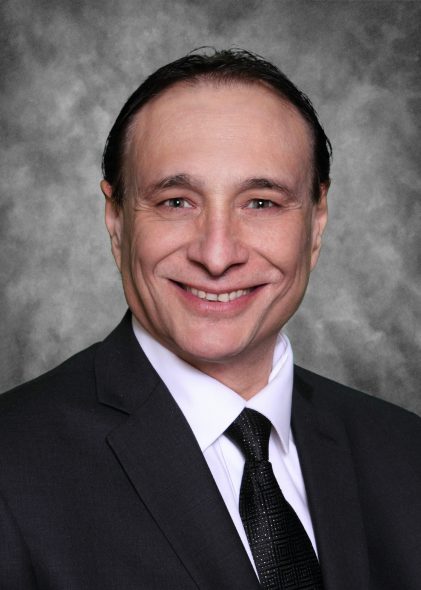Medical College of Wisconsin Names Raul A. Urrutia, MD, as Director of the Human and Molecular Genetics Center
Dr. Urrutia’s career and activities combine interests and expertise in the areas of genomics, epigenomics, and individualized medicine.
Milwaukee, Feb. 6, 2017 – The Medical College of Wisconsin (MCW) appointed Raul A. Urrutia, MD, as director of the Human and Molecular Genetics Center and professor of the Department of Surgery, effective July 1, 2017.
Dr. Urrutia currently serves as professor in the Departments of Biochemistry and Molecular Biology, Biophysics and Medicine at the Mayo Clinic College of Medicine in Rochester, Minn. and director of Epigenomics Education and Academic Relationships in the Epigenomics Program, Mayo Clinic Center for Individualized Medicine. Dr. Urrutia also holds the following positions at Mayo Clinic: consultant for the Division of Gastroenterology and Hepatology, Department of Internal Medicine, and consultant (joint appointment) of the Department of Physiology and Biomedical Engineering. He also is a member of the functional validation program for the Diagnostic Odyssey efforts within Mayo’s Center for Individualized Medicine.
MCW’s Human and Molecular Genetics Center (HMGC) was established in 1999 to provide the infrastructure for researchers and clinicians to use genomic sequencing to understand disease, improve diagnosis and advance patient care. The HMGC comprises 24 MCW faculty members from both basic science and clinical departments.
Dr. Urrutia received his MD degree from the University of Cordoba Medical School in Cordoba, Argentina in 1987. During medical school he undertook research in the Cell Biology Institute there, where he published studies on diet-induced genomic changes during the development of pancreatic cancer. From 1987-1992, Dr. Urrutia held numerous positions at the National Institutes of Health (NIH), including guest researcher, visiting fellow, visiting associate, and tenure-track visiting scientist, during which he trained in the fields of cell biology, molecular biophysics, protein chemistry and recombinant DNA techniques.
Dr. Urrutia’s career and activities combine interests and expertise in the areas of genomics, epigenomics, and individualized medicine. Since joining the faculty at the Mayo Clinic College of Medicine in 1992, Dr. Urrutia has served as director of the GI Unit, director of the PhD Program in Tumor Biology, associate director for Genomics at the Mayo Clinic General Clinical Research Center, and director of the GI Cancer Research Program at the Mayo Cancer Center. Also at Mayo, Dr. Urrutia established the first laboratory dedicated to epigenetics and chromatin dynamics in normal cell populations and in diseases, such as diabetes and pancreatic cancer. His laboratory has discovered diabetes-causing genes such as KLF11, for which its alterations are responsible for juvenile (MODY VII) and neonatal diseases, as well as KLF14 for insulin resistance metabolic syndrome. Dr. Urrutia’s laboratory has made fundamental contributions by identifying members and helping to put together the family of KLF proteins, which are critical regulators of biology, pathobiology and epigenetic reprogramming. In the area of chromatin and epigenetics, the Urrutia laboratory has discovered new histone deacetylase (HDAC), histone acetyltransferase (HAT), and histone methyltransferase (HMT) epigenetic pathways. His work also led to the discovery of histone-proteins associated subcodes, which helps to interpret epigenomic codes. All of these complexes are associated with the development of cancer, as well as many other diseases, and are currently being explored as an extremely promising area in experimental therapeutics. In the area of individualized medicine, Dr. Urrutia’s focus has been the identification and characterization of disease-causing variants for diabetes, cancer, cardiovascular diseases, and neurodevelopmental disorders. His work has been continuously funded by the NIH since the early 1990s.
In the field of pancreatic cancer, Dr. Urrutia has published influential original articles, book chapters, reviews and a widely cited textbook. He has served as the editor-in-chief for Pancreatology, International Journal of Gastrointestinal Cancer and Case Reports in Gastroenterology, and has been a member of the editorial boards of the Journal of Biological Chemistry, Medical Epigenetics, Pancreatology and Pancreas. Dr. Urrutia also serves as a manuscript reviewer for at least 15 prominent journals including Nature, Science and Cell.
Dr. Urrutia has served on the boards of various national and international societies. He is Past Chair for the Pancreatic Diseases Section for the American Gastroenterological Association (2005-2006), Past President for the American Pancreatic Association (2007), and a former member of the board of the International Association of Pancreatology. Dr. Urrutia has participated in more than 60 invited lectures, workshops and presentations, both nationally and internationally. His bibliography includes almost 400 articles, book chapters, editorials, letters and abstracts.
Dr. Urrutia will be relocating from Rochester, Minnesota with his wife, Gwen Lomberk, PhD, who will serve as associate professor, chief of the Division of Research, and director of Basic Research in the MCW Department of Surgery.
About the Medical College of Wisconsin
The Medical College of Wisconsin is the state’s only private medical school and health sciences graduate school. Founded in 1893, it is dedicated to leadership and excellence in education, patient care, research and community engagement. More than 1,200 students are enrolled in MCW’s medical school and graduate school programs in Milwaukee, 56 medical students enrolled at MCW-Green Bay, and 26 students matriculated to MCW-Central Wisconsin in 2016. MCW’s School of Pharmacy will open in 2017 or 2018 with an initial class size of 60 students. A major national research center, MCW is the largest research institution in the Milwaukee metro area and second largest in Wisconsin. In FY 2014-15, faculty received approximately $158 million in external support for research, teaching, training and related purposes, of which approximately $139 million is for research. This total includes highly competitive research and training awards from the National Institutes of Health (NIH). Annually, MCW faculty direct or collaborate on more than 3,200 research studies, including clinical trials. Additionally, more than 1,500 physicians provide care in virtually every specialty of medicine for more than 525,000 patients annually.
NOTE: This press release was submitted to Urban Milwaukee and was not written by an Urban Milwaukee writer. While it is believed to be reliable, Urban Milwaukee does not guarantee its accuracy or completeness.
Recent Press Releases by Medical College of Wisconsin
The Medical College of Wisconsin deliversnearly $6 billion economic impact in fiscal 2023
Dec 5th, 2024 by Medical College of WisconsinNation’s third-largest medical school has annual impact equal to hosting 31 Summerfest music festivals
Advancing a Healthier Wisconsin Endowment Invites Applications for $250,000 Momentum Grants
Sep 23rd, 2024 by Medical College of WisconsinFunding available for health improvement projects in Wisconsin
Medical College of Wisconsin’s Comprehensive Injury Center Selected as Injury Control Research Center by CDC
Sep 18th, 2024 by Medical College of WisconsinMCW chosen as one of only 11 institutions nationwide and will focus on reducing injury disparities.























